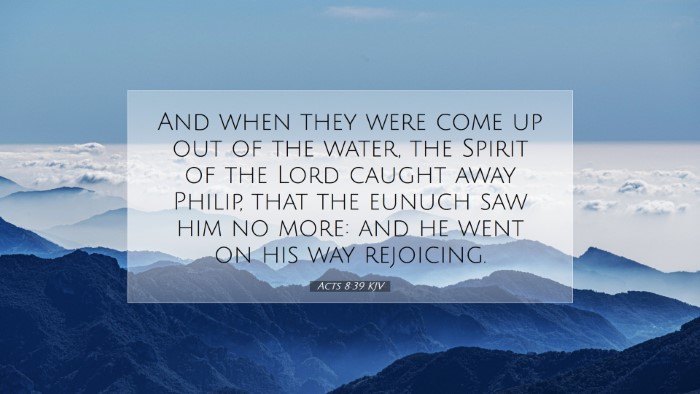Commentary on Acts 8:39
Acts 8:39 provides a pivotal moment in the narrative of the early church, illustrating the transformative power of the gospel and the guidance of the Holy Spirit. This verse reads:
"And when they were come up out of the water, the Spirit of the Lord caught away Philip, that the eunuch saw him no more: and he went on his way rejoicing."
Exegesis and Context
To fully appreciate Acts 8:39, we must examine its context within the chapter and the broader narrative of the book of Acts.
- Philip's Ministry: Prior to this verse, we see Philip engaging in a powerful ministry in Samaria, preaching Christ, performing miracles, and baptizing believers (Acts 8:5-13).
- The Ethiopian Eunuch: Philip's encounter with the Ethiopian Eunuch is a significant event demonstrating the outreach of the gospel beyond the Jewish community (Acts 8:26-38).
- Divine Guidance: The Holy Spirit directs Philip to join the eunuch's chariot, leading to a profound moment of enlightenment for the eunuch, culminating in his baptism (Acts 8:29-38).
Theological Insights
This verse encapsulates several theological themes important for pastors, students, and scholars.
- Celebration of Conversion: The eunuch's rejoicing emphasizes the joy that accompanies genuine conversion. His experience reflects the new birth, filled with joy and the assurance of salvation (Matthew Henry).
- Work of the Holy Spirit: Philip's sudden departure showcases the sovereignty of the Holy Spirit, who removes him from the scene after fulfilling God's command. It underscores the dynamic nature of God’s missions (Albert Barnes).
- Geographical Expansion of the Church: The moment signifies the growing reach of the gospel. The eunuch represents an important bridge to Africa, highlighting the universality of the Christian message (Adam Clarke).
Commentary Excerpts
Matthew Henry's Commentary
Henry notes that the narrative demonstrates not just the eunuch's obedience in baptism but also God's providence in placing Philip at the right moment and ensuring that the eunuch received the gospel. He emphasizes the joy of the converts, which is an indicator of the acceptance of faith in Christ.
Albert Barnes' Notes on the Bible
Barnes elaborates on the miraculous withdrawal of Philip. He interprets this as a sign of divine approval and the work of the Spirit in spreading the gospel. The eunuch's rejoicing is a powerful testament to the joy that comes from understanding and accepting the gospel message.
Adam Clarke's Commentary
Clarke reflects on the significance of the location and the identity of the eunuch, noting that this event marks an essential step in the historical unfolding of the Church's mission. He regards the joyous departure of the eunuch as emblematic of the transformative power of faith.
Applications for Pastors and Theologians
This passage offers fertile ground for application in contemporary ministry.
- Encouraging Evangelism: Philip's readiness to witness serves as a model for believers today, inspiring them to share the gospel and engage with diverse communities.
- The Importance of Baptism: The act of baptism represents a commitment to faith that believers should be encouraged to express openly and joyfully.
- Listening to the Holy Spirit: The events call attention to the necessity of being responsive to the Holy Spirit’s leading, a vital aspect of Christian discipleship.
Conclusion
Acts 8:39 provides a profound reminder of God's active role in the expansion of His kingdom. Through Philip’s obedience and the eunuch's response, we see the joyous nature of salvation and the incredible ways the Spirit works in our midst. This verse challenges readers to reflect on their engagement with the Holy Spirit, their willingness to share the gospel, and their response to God's work in their lives.
Further Reflections
As you meditate on this scripture, consider how the message of the gospel has transformed your life and how you can participate in that transformative work in others. The joy of the eunuch is a testament to the hope and life that come through faith in Christ.


